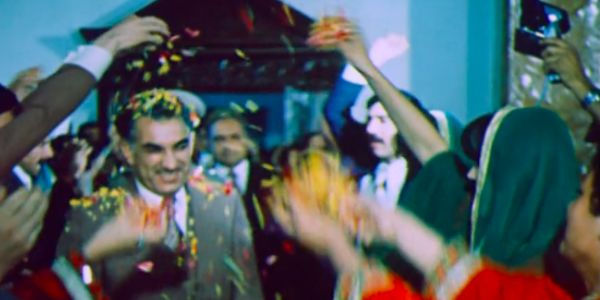WHAT WE LEFT UNFINISHED: Live Ammunition

Massive film lover. Whether it's classic, contemporary, foreign, domestic, art,…
By 1978 Afghanistan’s relationship with the Soviet Union had dissolved; president Daoud targeted Afghan communist groups resulting in the assassination of Peoples Democratic Party of Afghanistan (PDPA) leading figure, Mir Akbar Khyber. What followed was a violent coup by Afghan communists against the Daoud regime. Successfully overtaking the office, assassinating President Mohammed Daoud, thus upsetting the country’s long-standing non-alignment policy as the Communist regime took over, nationalizing the film industry, commissioning feature films while enacting strict censorship laws. What followed in the thirteen years was a slew of films that portrayed an idealized, non-existent regime rendered through the filter of a repressive republic.
A Dense Thesis Makes a Rewarding Film
Mariam Ghani’s What We Left Unfinished excavates five incomplete features from a period ranging from the late seventies following the Saur Revolution through the duration of The Democratic Republic of Afghanistan. This time is fractured by coup’s splintering revolutionary factions and foreign intervention, especially from the Soviet Empire. The role of Afghanistan’s ever-changing social and political landscape would shape and change the film industry in unforeseen ways, and Ghani’s film is powered by the curious, and fraught relationship that can exist between oppression and art, the pursuit of the creative endeavor against intellectual suppression and, of course, the subversive, and complex role of propaganda and film.

From the outset, it feels like there’s going to be a sense of distance from the content of What We Left Unfinished, showcasing a series of unfinished, elusive, and mostly unseen films from a very culturally and politically specific period? Admittedly, the thesis of What We Left Unfinished is a bit of a hard-sell. Still, Mariam Ghani’s approach isn’t a dare, nor does she sell the film as a gimmick, but rather, it’s a meditative look at the intervention of a regime in the pursuit of making movies. It’s an always relevant reminder of how important film is as an artistic medium.
Utilizing highlights from five incomplete features, The April Revolution (1978), Downfall (1987), Wrong Way (1991), Agent (1991) and The Black Diamond (1990) alongside new interviews with the cast and crew members, mostly actors and directors (some shared those credits) interspersed with archival footage, Mariam Ghani weaves an engrossing documentary from the stories behind these films and the believe-it-or-not production tales.

There are layers throughout, and its organic density lends us a subtly rewarding viewing experience. While directors Juwanshur Haidary and Latif Ahmadi discuss these movies, you can see that there’s a passionate catharsis in discussing these movies.
Dodging Bullets While Shooting Film
Like so many artists over the years, these filmmakers didn’t just utilize the available resources to explore prescient themes and issues; they simultaneously used the communist powers to bankroll their visions. Directors acting as artistic smugglers is almost as old as cinema itself, whether it be censorship or propaganda. However, the unpredictable and frankly dangerous conditions faced by these directors are unprecedented.
With The April Revolution, a film commissioned by Hafizullah Amin (minister/deputy to president Taraki, who ultimately assassinated Taraki, seizing power) sought to have the events of the coup d’etat dramatized to coincide with his vision. Not only was Amin overjoyed to provide the filmmaker with anything from tanks, trucks, soldiers, and air force, but he was also cast as himself, not just recounting the events as he remembers them but the events as he’d like the people to remember them. Re-writing history is kind of a thing that’s consistent with history’s less-desirables.

Actress Yasamin Yarmal shines a light on the male-centric societal roles that plagued women in the film industry. Not only were female performers secondary, Yarmal remarks on the budding influence of western culture and that being an actress, but you were also looked down as “a non-muslim, no better than a prostitute.”
Cinema as a Weapon
There are layers throughout, and its organic density lends us a subtly rewarding viewing experience. While directors Juwanshur Haidary and Lathif Ahmadi discuss these movies, you can see that there’s a passionate catharsis in discussing these movies. Other films, like Downfall, Wrong Way, Agent, The Black Diamond, utilize genre to explore topical issues such as espionage, private militias, and the drug trade while worrying about security details tailing them and the Mujahedin mistaking actors for insurgents.
Miriam Ghani’s Historical Collage
In recounting these stories, we see cinema as a tool, a form of entertainment, propaganda, and in ways both literal and metaphorical as a weapon. What Mariam Ghani provides is an active document that interacts with the viewer by sharing a unique, practically unheard of chapter of cinematic history that’s shaped by a nation’s tumultuous legacy. The curated movie clips are impeccably edited and illuminating in how raw these movies feel, not in terms of restoration; some of these surviving movies look terrific. While it might sound dense and only appealing to a niche demographic, Ghani’s immersive record is a curiosity that will satisfy any inquiring cinematic mind.
Seeing as What We Left Unfinished focuses on a time when government officials influenced filmmakers, do you see any parallels in today’s society? In a modern media age, during the end of the Trump presidency and with the reprehensible Harvey Weinstein facing prison, are we any closer to an air of equality?
https://www.youtube.com/watch?v=zAa-k6JmtkY
Does content like this matter to you?
Become a Member and support film journalism. Unlock access to all of Film Inquiry`s great articles. Join a community of like-minded readers who are passionate about cinema - get access to our private members Network, give back to independent filmmakers, and more.
Massive film lover. Whether it's classic, contemporary, foreign, domestic, art, or entertainment; movies of every kind have something to say. And there is something to say about every movie.












